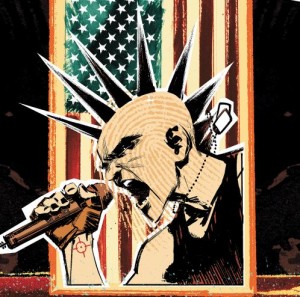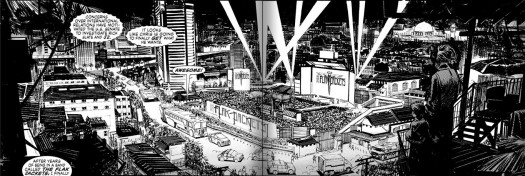Review: Punk Rock Jesus
Posted By Leo Johnson on January 3, 2013
 With an immediately attention-grabbing title, Sean Gordon Murphy‘s Punk Rock Jesus quickly gained both followers and critics in the comic world, even before the first issue was releases. In a near future United States, reality shows reign supreme. In order to capitalized on this, J2 is developed and will star the clone of Jesus. The show quickly divides the nation. Some religious groups see this show as an abomination, others as the Second Coming. Politicians worry about its influence on the nation, and scientists worrying about the ramifications of cloning a human being. In the midst of all this, a young girl named Gwen is chosen to be the mother of the cloned Christ, later named Chris. Because of all the drama and unrest surrounding J2, Thomas McKael, a former IRA member turned bodyguard, is brought on to protect the baby messiah. It’s in the midst of all this and all the attention that is draws that the supposed clone of Jesus, Chris, must grow up, and it’s what ultimately leaves him bitter and angry.
With an immediately attention-grabbing title, Sean Gordon Murphy‘s Punk Rock Jesus quickly gained both followers and critics in the comic world, even before the first issue was releases. In a near future United States, reality shows reign supreme. In order to capitalized on this, J2 is developed and will star the clone of Jesus. The show quickly divides the nation. Some religious groups see this show as an abomination, others as the Second Coming. Politicians worry about its influence on the nation, and scientists worrying about the ramifications of cloning a human being. In the midst of all this, a young girl named Gwen is chosen to be the mother of the cloned Christ, later named Chris. Because of all the drama and unrest surrounding J2, Thomas McKael, a former IRA member turned bodyguard, is brought on to protect the baby messiah. It’s in the midst of all this and all the attention that is draws that the supposed clone of Jesus, Chris, must grow up, and it’s what ultimately leaves him bitter and angry.
Sean Murphy touches on a topic that is often absent in comics. While you have many heroes who make mention of religion and God from time to time and heroes that are actual gods, it’s less often that you see a character who’s an atheist. While Tony Stark and Henry Pym are often depicted as atheists, they also have lunch and fight aliens with Thor on a daily basis, rendering their non-belief a bit moot. The world of Punk Rock Jesus is a world not much different than our own though. In this world, there aren’t Norse gods calling lightning from the sky or World War II supersoldiers punching bad guys. In this world, being an atheist carries much the same stigma that it often does today in many circles. It’s as both a comic lover and an atheist that I found the idea of the apparent clone of Jesus becoming an atheist so interesting and appealing. Still, just like in the comic, readers, both religious and not, were divided on the idea. Some called it sacrilegious, others called it interesting, and some even saw it as groundbreaking. Boycotts of DC’s entire lineup were even threatened in retaliation, showing just how jarring Murphy’s little comic was. 
The art in the miniseries was phenomenal. The art stayed completely black and white, with heavy hatching and cross-hatching in lieu of actual shading and tones, which added a certain unique quality to the overall look of the book. The art is often violent, gritty, and dark, but that’s exactly what it’s supposed to be. This is Punk Rock Jesus; the art isn’t meant to be “superhero style” refined. Instead, it’s a little explosive, a little loose, and the book is all the better for it.
Murphy’s story was immediately interesting to me. The prospect of the supposed clone of Jesus not even believing in the religion his original self pioneered immediately grabbed my attention. I picked up the book initially just to see how it played out. I kept picking up the subsequent issues because Murphy can write well. The character of Thomas in particular attractive me, as he’s obviously a troubled man. Thomas has done terrible things in the name of religion, but still holds to it dearly. Chris, in a way, is much like Thomas. After the death of their respective parents, they both begin to destroy what they feel is responsible for their personal tragedy. Thomas destroyed the RUC and UVF, the groups the IRA constantly waged war against. Chris took to destroying religion, the thing which he held responsible for his mother’s death. In this way, Chris and Thomas aren’t so different. The book also is set in such a way that each could be the main protagonist, which makes the reader think about whose overall story is more important: Chris or Thomas. 
The story ends up being less about “religion vs. atheism” and instead ventures into the examination of militarism and extremism. Groups on both sides, and even Chris himself in all his hypocritical preaching, devolve into to little more than extremist groups as the story progresses. Whether it’s the gun-carrying Christian groups staging a raid on the J2 compound or Chris ordering the masses to attack the media, the struggle becomes less and less about ideals and more and more about who has the bigger stick and uses it the most. It’s interesting to see a point of view that flatters neither side of the argument too much.
While the first five issue of this six issue miniseries were wonderfully paced, issue six seemed a bit rushed. It kept a great series from being magnificent and held the series back from its full potential. The revelations of Chris’ twin and actual source of his DNA weren’t completely necessary to the overall story, but surely Murphy put them there for a reason. While I think it may have lessened the overall impact of the story, I still enjoyed the overall miniseries immensely. It was a bold step in comics and a story like no other. I would be pleased to see more comics like it in the future, and certainly more projects from Murphy in which he does both art and story.

















Comments
Leave a Reply
Please note: Comment moderation is currently enabled so there will be a delay between when you post your comment and when it shows up. Patience is a virtue; there is no need to re-submit your comment.